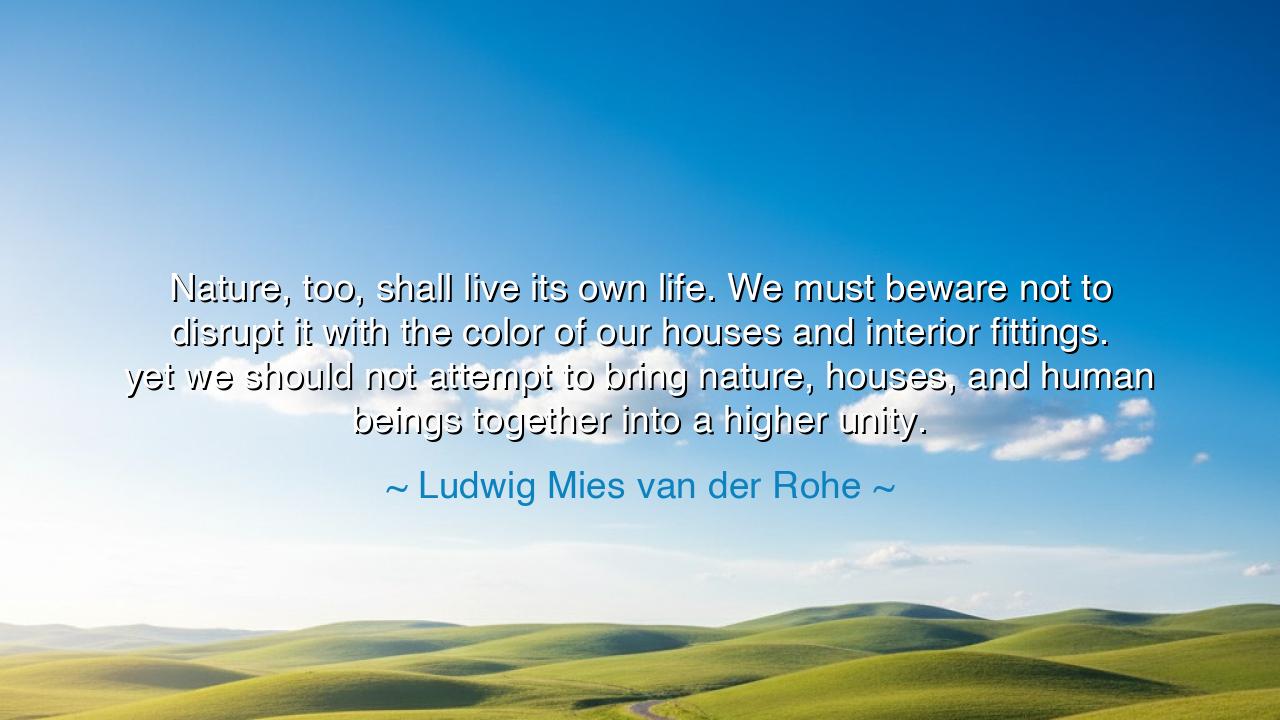
Nature, too, shall live its own life. We must beware not to
Nature, too, shall live its own life. We must beware not to disrupt it with the color of our houses and interior fittings. yet we should not attempt to bring nature, houses, and human beings together into a higher unity.






Ludwig Mies van der Rohe, master architect of simplicity and form, once declared: “Nature, too, shall live its own life. We must beware not to disrupt it with the color of our houses and interior fittings. Yet we should not attempt to bring nature, houses, and human beings together into a higher unity.” In these words lies a paradox, at once humbling and profound. He reminds us that nature is not a servant of our ambitions, nor a canvas for our whims, but a living reality with its own rhythm, its own dignity, its own truth.
The origin of this teaching emerges from Mies’s architectural philosophy, where restraint, clarity, and respect were his guiding principles. Unlike others who sought to conquer or overly romanticize nature, he saw it as something complete in itself. To him, architecture must not dress itself in colors or ornaments that seek to rival or outshine the landscape. The house must remain quiet, allowing the trees, the sky, and the earth to speak. His warning is sharp: do not imagine that man can force a “higher unity” by merging his works with nature’s; instead, let both stand in dignity, side by side, in balance.
This wisdom recalls the ancients. Consider the Greeks, whose temples were not attempts to dominate the mountains, but to stand in harmony with them, their columns rising like extensions of the hills themselves. Yet the temple never pretended to be the mountain—it was distinct, a dwelling for gods among men, while the mountain remained the dwelling of the gods themselves. This balance of respect echoes in Mies’s vision: man’s works must acknowledge their limits, for nature requires no correction, no fusion, no completion from us.
The meaning of his words is also deeply emotional. For man, restless in his ambition, often seeks to mold the world into one seamless unity, believing himself the master of harmony. But Mies tells us that such unity, if forced, is false. Nature must live its own life. To try to dissolve the line between man and earth is not wisdom but arrogance. True beauty arises when each keeps its integrity: the house as the shelter of human thought, nature as the eternal ground of life. In their meeting, there is dialogue—not domination, not fusion.
History shows what happens when this teaching is ignored. The sprawling industrial cities of the nineteenth century, belching smoke and choking rivers, tried to force nature into man’s service. The result was not harmony, but ruin—disease, pollution, ugliness. By contrast, architects such as Frank Lloyd Wright, though different from Mies, sought to let houses emerge gently from the land, respecting its contours. Even here, the tension remains: when man attempts too much unity, he risks silencing nature’s own voice. Mies’s warning still stands: do not confuse reverence with intrusion.
The lesson for us is one of humility. Let your home, your work, your art, exist in respect for the world around it. Do not paint your walls to compete with the sky, nor build in arrogance to tower over the trees. Instead, practice restraint. Allow nature to breathe freely beside your creations. When you walk in the forest, do not seek to own it with your presence—let it remain itself, untouched, unpossessed. For in respecting its independence, you also preserve your own dignity as man.
Practically, this means designing our lives with simplicity and reverence. When you build, choose materials that echo honesty rather than vanity. When you decorate, let your colors whisper instead of shout. When you dwell, remember that your house is not the master of the earth, but its guest. Above all, resist the temptation to control what should remain wild. For, as Mies teaches, the beauty of life is not in merging all into one false unity, but in honoring the integrity of each part—man, house, and nature—each living its own life in balance.
Thus, his words endure as a call to wisdom: be humble before nature, be disciplined in creation, be content with balance. Do not disrupt, do not intrude, do not force unity where there is already harmony. For the earth does not need man’s hand to complete it; it is already whole, already alive. Let us then live as respectful stewards, whose works stand quietly beside the eternal grandeur of nature.






AAdministratorAdministrator
Welcome, honored guests. Please leave a comment, we will respond soon